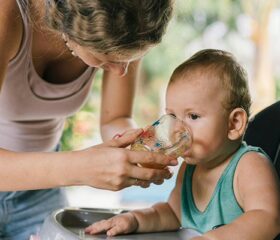Gripe Water: Side Effects, Dosage, and How to Use It
Dealing with a colicky baby is no joke, and the endless crying and sleepless nights may lead you to desperately search for anything that might ease his discomfort. You may have heard that gripe water is the elixir you need to calm your little one down.

Gripe water is an herbal liquid that’s purported to soothe a range of infant ailments, but what exactly is gripe water, and does it actually work? Let’s take a look at the history, ingredients, potential benefits, and risks of this (somewhat unusual) remedy.
What is gripe water?
Gripe water is a liquid supplement, typically sold over-the-counter, that’s alleged to help with infant gassiness, colic, newborn hiccups, and general fussiness. The earliest formulation of gripe water dates back to the 1850s in England, where it was originally used to treat malaria in children. 1
Doctors of the time found that this concoction also seemed to ease gastrointestinal issues in infants, and the remedy evolved into a popular choice for parents seeking relief for their babies’ “watery gripes”—now known as gastroenteritis.
Today’s gripe water is usually a mixture of water, herbs, and sometimes sweeteners. Common herbal ingredients include: 2 3
- Fennel seed extract
- Ginger root extract
- Chamomile flower extract
- Lemon balm leaf extract
- Dill
- Sodium bicarbonate (baking soda)
While this might sound like a harmless combination, it’s important to note that gripe water is not regulated by the US Food and Drug Administration (FDA). That means the safety, quality, and effectiveness of any brand of gripe water is never guaranteed.
Does gripe water actually work?
The million-dollar question: does gripe water really soothe fussy babies? Unfortunately, the answer isn’t a clear yes. There’s limited scientific evidence to back up the claims that gripe water effectively treats colic or other common infant ailments, and it may not be worth the risk of side effects.
Potential benefits of gripe water’s ingredients
While there’s no definitive proof that gripe water works as a whole, some of its individual ingredients have properties that could provide some relief. For example:
- Dill, fennel, and ginger can aid digestion and help with gas relief in adults. However, while they can be good natural remedies for older children, babies have less-developed digestive systems and may not react in the same ways. 4 5
- Sodium bicarbonate (baking soda) is an antacid, but it’s unlikely to help with colic because colic is not related to stomach acid.
It’s also worth noting that the original gripe water formula contained alcohol, which was thought to have a relaxing effect on babies. However, this isn’t a safe ingredient for infants, and modern gripe water products no longer contain it.
Similarly, some babies may find the sweet taste of gripe water soothing, but this can be problematic for their developing teeth. 6
Why do people believe gripe water works?
Even though there’s little scientific evidence that gripe water is effective, many parents swear by it. This isn’t as weird as it might seem, and may boil down to the placebo effect.
In a nutshell, parents may believe that gripe water works because they want it to (meaning they come to believe that their baby has become calmer without any actual change). It’s also possible that having a remedy (even one with no actual effect) calms parents down, and a less stressed-out parent can inspire a sense of calm in their child, too.
Is gripe water safe for babies?
Gripe water comes with several major safety concerns, and you’d be right to question if an unregulated supplement is really safe for your baby. While it’s unlikely that gripe water sold in the US will be outright toxic, its potential risks include:
- Allergic reactions: Any of the herbal ingredients in gripe water may provoke an allergic reaction. Signs include swelling of the lips, sneezing, wheezing, coughing, or a red, itchy rash. If you notice any of these symptoms after giving your baby gripe water, seek medical attention immediately. 7
- Contamination: Due to the lack of FDA regulation, there’s a risk of contamination from bacteria or harmful metals like lead or mercury. For example, in 2007, a child’s cryptosporidium infection—a parasite that comes from dirty water—was traced to a brand of gripe water. 8
- Sugar content: Some gripe waters contain sugars or sweeteners, which can cause tooth decay and also lead your baby to prefer sweet tastes. 2 9 That isn’t great if you’re hoping to raise them with healthy habits.
Potentially dangerous ingredients in gripe water
Some Indian gripe water brands may also use ingredients associated with Ayurvedic medicine, like Sarjikakshara and other plant derivatives. 10 The FDA has issued a warning in the past about the presence of lead and other heavy metals in Ayurvedic products. 11
There’s also another kind of gripe water that originates in Indian traditional medicine. This type of water is not to be confused with the gripe water you’re most likely to see in a pharmacy; it contains a bean called bala goli (dissolved into water). State and federal authorities caution that bala goli is also associated with lead poisoning and should be avoided. 12
Is it safe to give newborns gripe water?
Despite many brands listing dosages for 4-week-olds, you should wait until your baby is at least 4 months old before introducing any herbal supplements. 13
It’s also important to carefully check the ingredient list if your baby has known allergies and get the go-ahead from a pediatrician before trying gripe water.
If you notice side effects, stop using gripe water immediately and contact your pediatrician.
How to give your baby gripe water safely
Again, if you decide to give your baby gripe water, make sure you get the all-clear from your pediatrician. Then, follow these guidelines:
- Read the label carefully: Check the ingredients list for potential allergens, as well as the instructions for giving it to your baby. How much you’ll need to give depends on the brand and your baby’s age.
- Follow dosing instructions: Most brands include a syringe for accurate dosing, but others may measure by teaspoon. If possible, avoid using a household spoon or other utensil that lacks measurement lines or a standardized size.
- Monitor your baby closely: Watch for signs of allergic reaction or other side effects.
Alternatives to gripe water
Gripe water may be an old remedy, but it’s far from the only way to soothe your baby’s upset stomach. If you’re hesitant about using it or it hasn’t worked for your baby, try these other methods: 14
- Burp more often: Burping your baby is the most tried-and-true way to get gas out of his body before it causes him discomfort.
- Dietary adjustments: If you’re breastfeeding, consider eliminating common allergens (dairy, soy, caffeine) from your own diet to see if that helps. 15 What you eat affects your milk!
- Change your formula: Switching to a hydrolyzed formula can reduce the effects of a dairy allergy, and non-powder formulas (like concentrated or ready-to-feed) will transfer fewer bubbles to your baby’s stomach. 16
- Adjust latch or bottle: Your baby may be swallowing too much air when he feeds. You can reduce this by improving your latch, switching to a lower-flow nipple when you bottle feed, or upgrading to a different bottle entirely (the best baby bottles for gassiness have anti-colic designs).
- Anti-gas drops (simethicone): These drops can help gas bubbles pass more easily through the digestive tract and are considered safe for babies, but their effectiveness is also up in the air. 17
You can also comfort your baby through his colic in other ways. Swaddling or rocking him is a great way to make him feel calm and secure. Try turning on a fan for white noise. Tummy time and infant massages can also relieve trapped gas and boost his mood.
When to consult a doctor after giving your baby gripe water
If you give your baby gripe water, keep an eye on his behavior. If he becomes fussier, you should talk to your pediatrician to rule out possible medical conditions and get tailored advice.
Seek medical attention immediately if he has any of the following symptoms. (Note that these are warning signs that you should always promptly see a pediatrician about, whether or not he just had gripe water.)
- Fever (100.4 F or higher)
- Lethargy
- Poor feeding
- Vomiting (more than just ordinary spit-up)
- Diarrhea or bloody stools
- Weight loss
Log any concerning symptoms you see in your journal or baby tracker app so you know exactly what to report to your doctor.
Final thoughts
As we’ve explained, although gripe water is a popular remedy for fussy babies, there isn’t strong scientific evidence to back it up. What’s more, the lack of regulation and potential for an allergic reaction makes it a riskier solution than most remedies for infant stomach issues.
Ideally, focus on safe and proven alternatives to soothe your colicky baby—but if you’re at your wits’ end and are looking for anything to calm your baby down, speak with your pediatrician first.
Article Sources
- Journal of the Royal Society of Medicine. "The gripe water story" Retrieved July 23, 2025.
- American Family Physician. "Infantile Colic" Retrieved July 23, 2025.
- Cleveland Clinic. "Why Gripe Water Isn’t the Best Answer for Your Fussy, Gassy or Colicky Baby" Retrieved July 23, 2025.
- Children's Hospital of Philadelphia. "Food as Medicine: Food Therapy for Gastroparesis" Retrieved July 23, 2025.
- Washington College. "Dill" Retrieved July 23, 2025.
- Head Start. "Promoting Oral Health for Babies" Retrieved July 23, 2025.
- MedlinePlus. "Allergic reactions" Retrieved July 23, 2025.
- AAP News. "FDA traces infant's Cryptosporidium infection to Baby's Bliss Gripe Water herbal supplement" Retrieved July 23, 2025.
- Thrive Initiative Blog. "Dietary Guidelines for Infants and Toddlers" Retrieved July 23, 2025.
- Journal of Pharmacology and Pharmacotherapeutics. "Is gripe water baby-friendly?" Retrieved July 23, 2025.
- US Food and Drug Administration. "FDA warns about heavy metal poisoning associated with certain unapproved ayurvedic drug products" Retrieved July 23, 2025.
- Washington State Department of Health. "Lead in home remedies" Retrieved July 23, 2025.
- National Capital Poison Center. "Don't Give Herbal Supplements to Infants" Retrieved July 23, 2025.
- HealthyChildren.org. "Gas Relief for Babies" Retrieved July 23, 2025.
- Golisano Children's Hospital. "Elimination Diets in Lactation" Retrieved July 23, 2025.
- University of Colorado Anschutz Medical Campus. "What Do I Need to Know About My Child’s Cow’s Milk Allergies?" Retrieved July 23, 2025.
- StatPearls. "Simethicone" Retrieved July 23, 2025.





